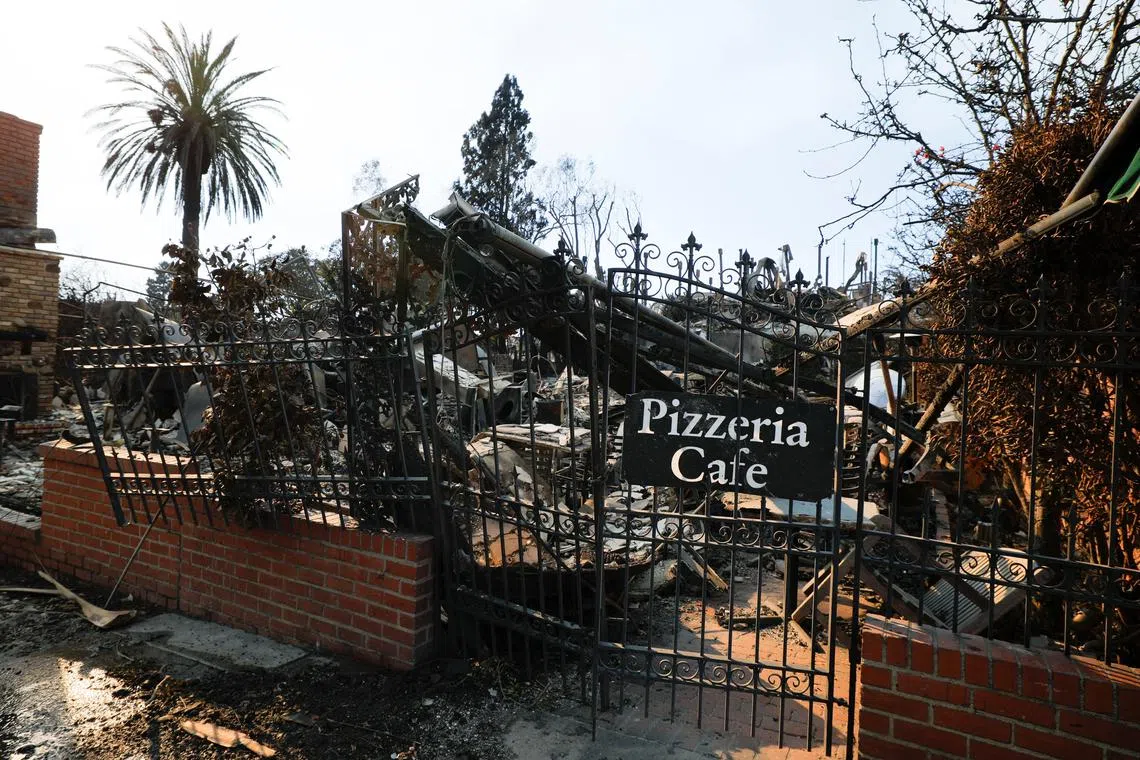LA wildfires: Residents stunned and tearful as they return to find their homes gone
Sign up now: Get ST's newsletters delivered to your inbox

The wildfires had killed at least 10 people as of the morning of Jan 10 and destroyed or badly damaged more than 10,000 structures.
PHOTO: REUTERS
Follow topic:
LOS ANGELES - Survivors of the wildfires that have been sweeping through parts of Los Angeles
Many instead found little more than concrete foundations, ashen rubble and memories.
The wildfires, among the worst natural disasters ever to hit California, have killed at least 10 people as at the morning of Jan 10 and destroyed or badly damaged more than 10,000 structures, the authorities said.
Aerial images of some scorched neighbourhoods – including parts of Pacific Palisades, a mostly affluent enclave west of downtown, and Altadena, a diverse neighbourhood on LA’s eastern edge – show block after block of homes burnt to the ground, as if in a war zone.
Those who survived say they feel fortunate to have escaped with their lives. But many shed tears over family homes lost and fears about uncertain futures.
In a neighbourhood of 60 homes ravaged by the Palisades fire, the only thing left standing at Mr Rick McGeagh’s ranch house near the Will Rogers State Park is a statue of the Virgin Mary he installed when they moved there in 1998. It had belonged to his grandmother, who had died a year earlier.
He called the statue’s survival an “amazing blessing” in a terrible time. “I think it’s miraculous.”
Mr McGeagh, 61, a commercial real estate broker who along with his wife raised three children in their home, said only six homes in his neighbourhood remained standing.
“Everything else is ash and rubble,” he told Reuters on Jan 10.
He first noticed the fire on Jan 8, when he was out walking his dog near the park and saw odd-looking white clouds that turned out to be smoke. He rushed home, packed everything that he could grab in his car and fled with his wife.
Later that day, they watched the progression of the fire on their home security camera.
“We saw the neighbour’s house across the street go. Then our camera went out. We’re obviously devastated, but grateful to have each other,” Mr McGeagh said.
Avocado tree offers sliver of hope
In Altadena, Ms Alita Johnson, a lifelong resident whose home burned down, was seeking assistance at an evacuation centre on Jan 9 when she bumped into a friend there.
After greeting the man and giving him a hug, Ms Johnson, 61, said: “I lost my house.”
In a reply all too common in Los Angeles this week, her friend replied: “I know, I’m sorry – we lost everything, too.”
En route to see the charred plot of land where her home once stood, Ms Johnson, sitting in the passenger seat of a car, pointed ahead of her and told a Reuters reporter: “This is where I live.”
In a trembling voice, Ms Johnson then corrected the tense: “Where I lived.”
Her voice rose a little as she noted her avocado tree survived. It was one of the few signs of hope in sight.
“Nothing prepares you for this amount of destruction,” she said, her eyes welling with tears.
On the street
Mr Paul Lewis, another Altadena resident whose home burned down, said on Jan 9 in a matter-of-fact voice: “Now we’re homeless. We’re searching for a place to stay.”
Mr Lewis and his wife had tried to return to their home in the hope of recovering any personal effects not consumed by the flames, he said. But the area where they live was blocked off to vehicle traffic. He did not want to walk 1.6km or so to their home with two young children and a dog in tow.
A day earlier, they were able to reach the home by car and found it burnt down to the foundations, still smouldering.
Mr Lewis said that his garage was still on fire that day.
Hotels in the area are fully booked, mostly by people forced to flee their homes, Mr Lewis said. Properties were scarce on online rental marketplaces, he said.
Mr Lewis said his house was covered by insurance, but he was girding for a long fight to recover its value. He foresaw a scenario in which he would have to hire an attorney “to make sure we’re protected”.
“Insurance companies for a while have been trying to drop coverage for people like us, who live near natural habitat,” he said, referring to the nearby Eaton Canyon area. “I’m sure they’ll do everything they can to undercut our claim.”
Overwhelmed by destruction
At a mobile home park in Pacific Palisades, a man who wanted to be known only as Curtis grimaced, and his eyes welled with tears as he took in the ruins all around him. Asked what he had lost, he replied immediately: “Everything.”
Then he recalled that he did have his vehicle and “whatever’s in the car”.
Overwhelmed by the scenes of destruction around him, he added that he hoped a feral neighbourhood cat – a beloved local character – “made it out safely”. REUTERS

